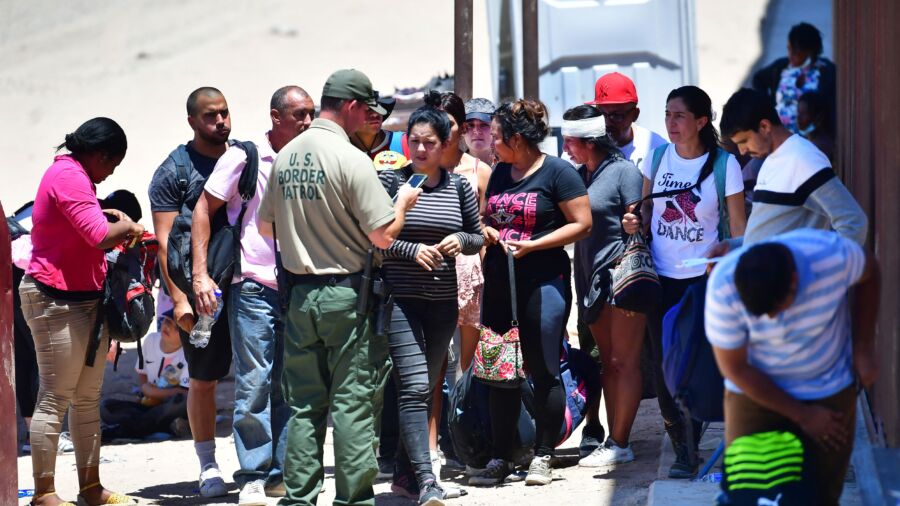A federal judge on Tuesday ordered a preliminary injunction on the Biden administration’s “parole with conditions” policy that would allow federal authorities to release illegal immigrants into the country without a court date.
Judge T. Kent Wetherell, who placed a temporary restraining order (TRO) on the policy last week, on Tuesday found that Florida would suffer “irreparable harm” without the injunction.
“Florida is entitled to a preliminary injunction prohibiting DHS (Department of Homeland Security) from ‘paroling’ aliens into the country under the Parole with Conditions policy,” the judge wrote in his ruling (pdf).
DHS also requested that the court convert the TRO ordered on May 11 into a preliminary injunction that would remain in effect while the case plays out so that it can seek review from an appellate court.
Florida had argued that without the injunction, the state would suffer harm by the mass release of illegal immigrants into the country, as some of them would travel to Florida. The judge, an appointee of former President Donald Trump, agreed.
Wetherall further agreed that Florida had met its burden of proof with respect to the case succeeding on the merits, that the injunction outweighs the harm it would cause DHS, and that it won’t be averse to the public interest.
The preliminary injunction ordered on Tuesday is in the public interest, Wetherall said, “because it would promote respect for the rule of law by not allowing DHS to achieve what amounts to an end-run around this Court’s decision in Florida through the adoption of a functionally identical policy to the Parole + ATD invalidated in that case.”
Wetherall wasn’t convinced by the federal government’s arguments that “the sky will fall if it cannot release aliens under the Parole with Conditions policy.” The ruling noted that recent U.S. Customs and Border Protection (USBP) data shows that “encounters at the border have dropped significantly after the expiration of the Title 42 Order.”
DHS provided some data with its filing to offer a glimpse into the southern border crisis. Rather than help its argument, the judge found that it bolstered the order that denied a stay of the TRO.
“Indeed, as of two days ago, the number of aliens arriving [at] the border was about one-third of the number predicted in the declaration that DHS relied on in support of its argument that the sky will fall if it cannot release aliens under the Parole with Conditions policy,” Wetherall wrote (pdf).
“Likewise, contrary to the prediction in the declaration that USBP was projected to grow to ‘over 45,000 individuals in custody by the end of [May],'” he continued, “the USBP data shows that the number of individuals in custody has declined every day since the Title 42 Order expired, and as of May 14, only 22,259 aliens were in custody.”
Wetherall granted the injunction and ordered both parties to file a status report in two weeks explaining how they intend to proceed with the case, pending the resolution of DHS’s expected appeal.
?BREAKING NEWS ?
Attorney General Moody obtains preliminary injunction in Florida’s case challenging @JoeBiden’s unlawful mass-release immigration policy.
In the order, a federal judge writes, “The Court finds that a preliminary injunction is necessary to prevent irreparable…
— AG Ashley Moody (@AGAshleyMoody) May 16, 2023
Lawsuit History
Tuesday’s ruling marks the third in this fast-moving case matter, Florida v. United States (Case number: 23-cv-9962).
On Wednesday, May 10, Florida filed a legal challenge against the legality of the Parole with Conditions policy. Just before midnight on May 11, on the eve of the end of Title 42, Wetherall issued a temporary restraining against the policy.
The next morning, on Friday, DHS asked the court to resume the fast-track release of illegal immigrants. That night, the court entered a TRO enjoining DHS from “implementing or enforcing” the Parole with Conditions policy.
Over the weekend, DHS filed a motion to stay the TRO, which Florida asked the court to reject. On Monday night, May 15, the court denied DHS’s request to stay the order.
In March, the same judge invalidated another U.S. Customs and Border Protection (CBP) parole policy known as “Parole + Alternatives to Detention (ATD)” in a separate case, Florida v. United States (Case number: 21-cv-01066).
Florida has argued, and the judge agrees, that the unlawful “Parole + ATD” policy is identical to DHS’s new program, titled “Policy on Parole with Conditions in Limited Circumstances Prior to the Issuance of a Charging Document.”
This invalidated parole program would release illegal immigrants into the United States after national security and public safety evaluation and without a court date.
Instead of a court date, the illegal immigrants would schedule an appointment to appear at a U.S. Immigration and Customs Enforcement (ICE) facility online within 60 days or would get a Notice to Appear (NTA) via mail after being released.
Illegal immigrants who enrolled in the ATD program are subject to supervision, according to the CBP policy memorandum.
DHS asked the judge to stay both orders and said they will appeal two rulings by the court by May 15 at the U.S. 11th Circuit Court.
Florida Attorney General Ashley Moody objected to the motion, saying that the Biden administration is trying to continue the “unlawful policy,” which she argued in a court filing they allegedly did “apparently counting on the fact that no one would catch wind of what it was up to.”
From The Epoch Times

